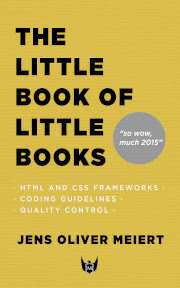The Little Book of Little Books
Published on October 29, 2021 (↻ May 9, 2024), filed under Web Development (RSS feed for all categories).
Tip: EPUB and PDF, with updates, at Leanpub.
In 2015 and 2016, I produced a series of “Little Books” for O’Reilly: The Little Book of HTML/CSS Frameworks, The Little Book of HTML/CSS Coding Guidelines, and The Little Book of Website Quality Control.
While I soon liked the idea of translating The Little Book of HTML/CSS Frameworks into German (I believe it to be one of my best books, and also one that’s still relevant), and, in the spirit of living books, also thought to update the titles, O’Reilly didn’t want to go for translations or new editions. However, O’Reilly was first so kind to grant me the rights to produce a German version of the frameworks book, and then released the rights to all “Little Books” back to me.
This allowed me to consolidate and refresh all three books, in an updated ebook called: The Little Book of Little Books. It’s now available on several platforms:
| Format and price | Ebook (EPUB and PDF), $7.99 |
|---|---|
| Kindle ebook (free app for Android and iOS), $7.99 | |
| Tip: Get this book at a discount with another book (at Leanpub). | |
| Preview | Select chapters (PDF, 584 KB) |
| Length | 90 pages (PDF) |
| Sellers | Amazon |
| Apple Books | |
| Kobo | |
| Google Play Books | |
| Leanpub | |
| Gumroad | |
| SitePoint | |
| Latest version | 1.6.37 |
Description
The Little Book of Little Books consists of three booklets, originally released in 2015 and 2016. They have been lightly updated and edited (with permission and release by the former publisher, O’Reilly).
The Little Book of HTML/CSS Frameworks provides guidance for the development and use of web frameworks. It was written during a time when frameworks were used by linking to their style sheets. While times have changed, it’s the author’s conviction that the principles outlined in the book still hold, and that it provides unique views to the advantage of everyone working with frameworks.
The Little Book of HTML/CSS Coding Guidelines outlines the benefits of coding standards and discusses them on the basis of the Google HTML/CSS Style Guide. It was written during a time when there was little tooling to format code automatically. Back in 2012, the author had revised and published the Google guidelines; many years later, he maintains that the modern frontend developer and their craft still benefit from such standards.
The Little Book of Website Quality Control reviews quality assurance and control and offers a comprehensive collection of tools. It was written during a time when there were few automated testing options, with a focus on web-based manual testing. The author believes this has been one of his weakest books, ponders why he didn’t do better, but likes the idea that, over time, he can make updates that make it a little less shallow.
→ This is the book if you want to travel back in time for a complementary perspective on frameworks, coding guidelines, quality control—and the craft of web development.
❧ I believe the description to say it all—travel back in time for a complementary perspective on frameworks, coding guidelines, quality control, and the craft of web development—, but I also want to thank all the various people again who have helped create The Little Book of HTML/CSS Frameworks; The Little Book of HTML/CSS Coding Guidelines; The Little Book of Website Quality Control; and The Little Book of Little Books itself. Thank you.
This, like many of my indie writings, is a living book. Accordingly, on platforms like Leanpub and Google Play Books, you should get updates automatically. Thanks for your attention and your support—enjoy!
About Me

I’m Jens, and I’m an engineering lead and author. I’ve worked as a technical lead for companies like Google and as an engineering manager for companies like Miro, I’m close to W3C and WHATWG, and I write and review books for O’Reilly and Frontend Dogma.
With my current move to Spain, I’m open to a new remote frontend leadership position. Feel free to review and refer my CV or LinkedIn profile.
I love trying things, not only in web development, but also in other areas like philosophy. Here on meiert.com I share some of my views and experiences.
Read More
Maybe of interest to you, too:
- Next: HTML Concepts: Common Idioms
- Previous: Making the Web Developer’s Pilgrimage
- More under Web Development
- More from 2021
- Most popular posts
Looking for a way to comment? Comments have been disabled, unfortunately.

Get a good look at web development? Try WebGlossary.info—and The Web Development Glossary 3K (2023). With explanations and definitions for thousands of terms of web development, web design, and related fields, building on Wikipedia as well as MDN Web Docs. Available at Apple Books, Kobo, Google Play Books, and Leanpub.

